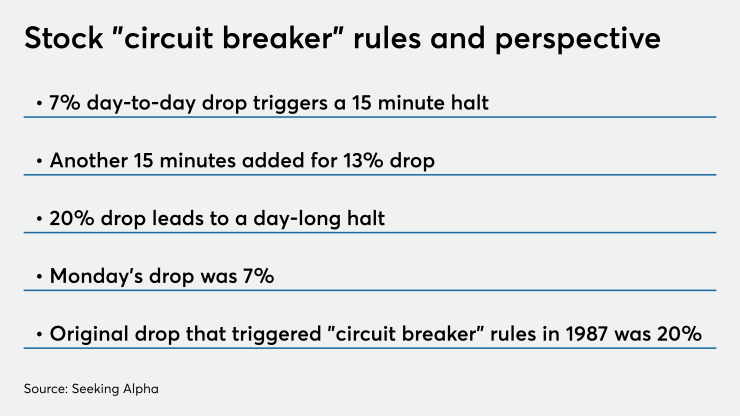Mortgage companies that borrow heavily to keep their operations running may face financial pressure from coronavirus-related market volatility as it affects the valuations of collateral securing their financing.
For example, some nonbanks use financing secured by mortgage servicing rights. Those MSRs’ valuations have been and will likely to continue to be hit hard by runoff given the stock circuit breaker-tripping

Commercial-financing providers working with mortgage bankers will likely ask for additional capital or collateral as a result, and some leveraged companies might find it difficult to continue operating because they can’t meet these demands.
“If you have adequate cash in mortgage banking, this could be an opportunity to buy,” said Les Parker, managing director at consultancy Transformational Mortgage Solutions, in an interview.
Some investors are showing interest in buying mortgage production and others are showing an interest in platforms, Parker said in his daily market report.
Banks tend to have more capital resources than nonbanks and are among potential buyers. It could potentially reverse some of the shift in market share toward nondepository financial institutions.
“Larger banks may take bigger positions in the market,” he said.
But buyers will have to consider the outlook for mortgages remains mixed.
In addition to potential funding issues, long-term borrower demand is unclear. The market movements reflect an increasing consensus that a recession is becoming more unlikely.
“The market is pricing in an economic slowdown due to the coronavirus and the long-term effects are wide ranging,” said Emanuel Santa-Donato, director, capital markets at online mortgage lender Better.com, in an email. “While mortgage rates are not directly affected by Fed rate decisions, they generally follow the lead of the bond market. Lenders use the 10-year Treasury as a guide to pricing loans. Lower rates are likely to drive refinances higher and may entice home buyers out to shop as well. A lower cost of financing is beneficial for home affordability. If an economic slowdown comes to fruition, it will slow the steady climb of housing prices, another win for affordability.
“Not all consumers may be in a position to get into the housing market, however,” he added. “Certain industries will be more affected by a virus-related slowdown, transportation, for example, and those working in these industries may face job cuts or layoffs.”
In addition, the mortgage industry won’t be the only business to potentially face stress on its financing rates because the market is pricing in the possibility of a recession.
U.S. corporate debt has been concentrated in some credit-sensitive rating categories and will likely experience downgrades, Parker noted.
The number of issuers, for example, is highest in the mid-range speculative-grade single-B category at nearly 1,200, according to Standard & Poor’s 2019 annual report on U.S. corporate debt distribution.
The largest dollar volume of debt is concentrated in the BBB category, which is the lowest rated category to still be considered investment-grade. This category accounts for over $3.5 trillion of debt.




